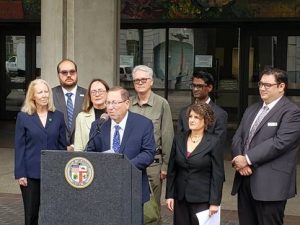Updates From the Capitol: Improving California’s Key Transportation Programs
This year has been tough for clean transportation in California. With the State making budget cuts and a powerful highway lobby pushing back, the Coalition for Clean Air and our allies have had our work cut out for us.
CCA is one of the leaders of a climate budget defense campaign that seeks to protect incentive dollars. We proposed shifting transportation funding away from highway expansions, which worsen air pollution, and towards public transit, biking, and walking infrastructure. This would free up resources to protect clean vehicles and infrastructure programs. We’re also proud of our role in securing a $1.9 billion plan to expand zero-emission transportation infrastructure for cars, trucks, and buses.
We’re not just defending existing programs, we’re pushing for stricter regulations and new policies. We’re sponsoring two key bills: SB 1193 aims to phase out lead in aviation fuel and AB 2401 works to improve a program that replaces old, polluting vehicles for low-income drivers.
Beyond legislation, we’re influencing agency actions. We’re closely monitoring the California Air Resources Board’s efforts to strengthen the Low Carbon Fuel Standard and advocating for adjustments to the current proposal. We’re also engaging with the South Coast Air Quality Management District, urging them to adopt strong rules to reduce emissions from ports and rail yards. CCA has been working to build a coalition of health professionals, faith leaders, and others to support a robust process and rule outcome.
We’ll keep you updated on our work throughout the year, and how you can help by taking action on these key issues.
[divider width=”medium”]
LEGISLATION
Budget
California is facing another large funding shortfall. Due to this, budget discussions have been tense as everyone is looking to preserve their program funding. Governor Newsom has been looking to the climate budget for a disproportionate share of the cuts he proposes to close the state’s deficit. CCA is one of the leaders of a climate budget defense campaign that seeks to protect incentive dollars. Our proposal is to shift transportation funding from highway expansions that increase emissions to public transit, rail, and walking and biking facilities, which would free up climate funds to protect clean vehicle and infrastructure programs.
Additionally, the California Energy Commission recently approved a $1.9 Billion Plan to Expand Zero-Emission Transportation Infrastructure that supports cars, trucks, and buses. CCA served on the advisory committee for the plan and was a key voice at the Commission’s business meeting. Building more charging/fueling stations is vital to the success of the transition to zero-emission transportation as at least 50% of the CEC’s Clean Transportation Program spending goes to benefit disadvantaged and low-income Californians, a requirement CCA was instrumental in passing.
Policy Bills
This year CCA is sponsoring two policy bills with our allies:
Getting Lead Out of Aviation Fuel, SB 1193 (Menjivar)
This bill would phase out lead aviation fuel sold in California. Californians are still suffering from the effects of lead pollution. For example, a study conducted in Santa Clara County found that children living next to the airport have higher lead levels in their blood compared to children living elsewhere. Lead poisoning is especially detrimental for children as it can cause irreversible cognitive and developmental issues. Lead emissions are harmful to adults as well as they increase the risk of cardiovascular diseases and premature birth in pregnant women. To address these harms caused by lead exposure, SB 1193 would expedite the phase-out of lead aviation fuel and direct airport operators to use cleaner alternatives, starting with airports located in the most disadvantaged communities.
Modernizing the Clean Cars 4 All Program, AB 2401 (Ting)
This bill would improve the effectiveness of the scrap-and-replace program for low-income drivers by prioritizing the oldest, dirtiest vehicles that are being driven the most miles. The Clean Cars 4 All program awards incentives to low-income Californians who are looking to scrap their old polluting cars to switch towards new zero-emission cars. While this program remains an important tool in reducing the amount of air pollutants and greenhouse gasses released by our transportation system, it still faces some difficulty in its implementation. AB 2401 guides the California Air Resources Board to update the guidelines for this program to ensure that it is being implemented all across the state and that the incentives reach our most vulnerable communities to encourage them to switch out their most polluting cars.[divider width=”medium”]
AGENCY ACTIONS
Caltrans System Investment Strategy
The Coalition for Clean Air has been actively involved in shaping the project selection rubric Caltrans is developing, known as the Caltrans System Investment Strategy (CSIS). This rubric will evaluate projects based on their ability to meet the state’s sustainability principles if they choose to apply for state funding and will send projects back for a redesign if they fail to meet the requirements.CCA has met with various transportation agencies to advocate for robust metrics within the rubric as well as transparency within the scoring system. In particular, we requested that the timeline of implementation as well as the final CSIS scores be made available to the public, as well as removing curve scoring to ensure that all submitted projects strive to achieve the highest scores which will improve the sustainability and accessibility of our transportation system. This rubric should be finalized by the end of spring and will be used to evaluate transportation projects starting in July.
South Coast Freight Facility Emission Rules
The South Coast Air Quality Management District is considering two Indirect Source Review Rules for rail yards and ports to reduce emissions from these sources and the emissions they attract. CCA has been working to build a coalition of support in the air district of health professionals, faith leaders, and others to support a robust ISR process and rule outcome. We are working to build support in communities and in meetings with AQMD Governing Board Members around the district this spring and summer as the ISR process continues and the rules come up for a vote.
CARB Low Carbon Fuel Standard
The California Air Resources Board is considering a set of amendments to strengthen its groundbreaking fuels rule, which reduces the carbon intensity of transportation fuels and accounts for a large chunk of the reductions in greenhouse gas emissions required by state law. We support the strengthening, but we also are advocating for some fixes to the current staff proposal. The issue is both complex and controversial, and CCA has continued to be an active participant at workshops and hearings to encourage the state to strengthen this important regulation.








